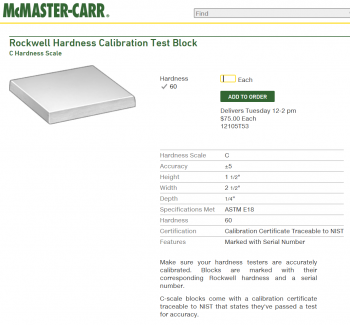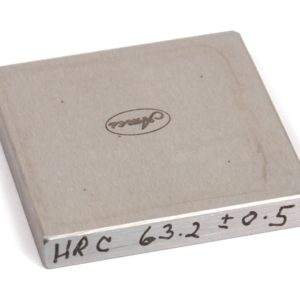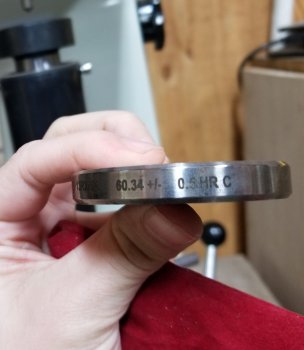We don’t need our testers certified, test block yes, testers no. Ted, I applaud your desire to want some verifiable standards by which to gauge your work. You would not believe the number of folks to whom I have to point out that a test done on anything less than a polished, flat and parallel surface is all but worthless. And almost every HRC test I see consists of only one reading. Accurate Rockwell is an average, I prefer at least 5 and this is why my numbers will include decimal points despite most Rc dials being whole number increments. And you are one of the precious few that I have ever seen inquire about test blocks to see if the machine is even reading correctly, and it does take due diligence to keep them reading correctly. With proper care I mange to keep mine within 1 point, and it makes my teeth itch when it swings more than .5.
Here are just a few things people should probably ask if they want their HRC test to mean anything at all-
Where do you keep your tester? Is it in a clean, dry, environment and on a stable base? Large temperature swings are awful for HRC testing. The dash pot oil is very sensitive to temperature and you want that major load applied in a 4-8 second window, outside of that and your numbers will start to wander. There is an adjuster for the hydraulics on the top of the dash pot.
Is your elevator screw well protected? Believe it or not that telescoping sleeve around your elevator screw is one of the most critical parts of that tester. Dirt, dust or rust on those screw threads will render your numbers useless. Even the oil that is supposed to be on those threads has to be dealt with. Before starting a series of tests, I always slip a test block into the tester and apply the major load for about a minute and a half to squeeze any interference out of the threads, give it a try and you will be amazed at the difference it makes in the first few tests! If you ever hear any microscopic crunchy noises when you apply the major load, throw the test out, the anvil needs to be as clean as a test block.
Precision Vs. accuracy- HRC numbers are just like sighting in a rifle, if you have a real tight grouping low and to the left, all you have to do is adjust windage and elevation and you can get a bullseye. But if your pattern is scattered all over, you have real trouble, and may need a new tester since, as has been mentioned, having it repaired can cost more than finding a good used unit.
If the numbers are all over the map- check your penetrator- examine the test marks under magnification, are they perfectly round and uniform? If not, you may be able to fix things by just buying a new penetrator. Much cheaper! And always protect that penetrator. Diamonds are brittle things. Never bump it, and protect it with your finger whenever changing anvils.
I am highly suspicious of tests done on surfaces with less than a 400X finish. Blades hanging way off to one side of the anvil can skew the tests. When somebody hands me a blade with a hamon, or any blade made from 10xx series steel that is more than 3/16” thick, and tells me its Rockwell, I just smile and say “well isn’t that nice”. Now, before the debate begins, just take some time to really think about that situation, from all angles, and you may see what I mean.
These are just a few points as to why Rockwell numbers can be a very handy tool in dialing in your heat treatment, but is often given far more weight than it can actually carry on a number of levels.




